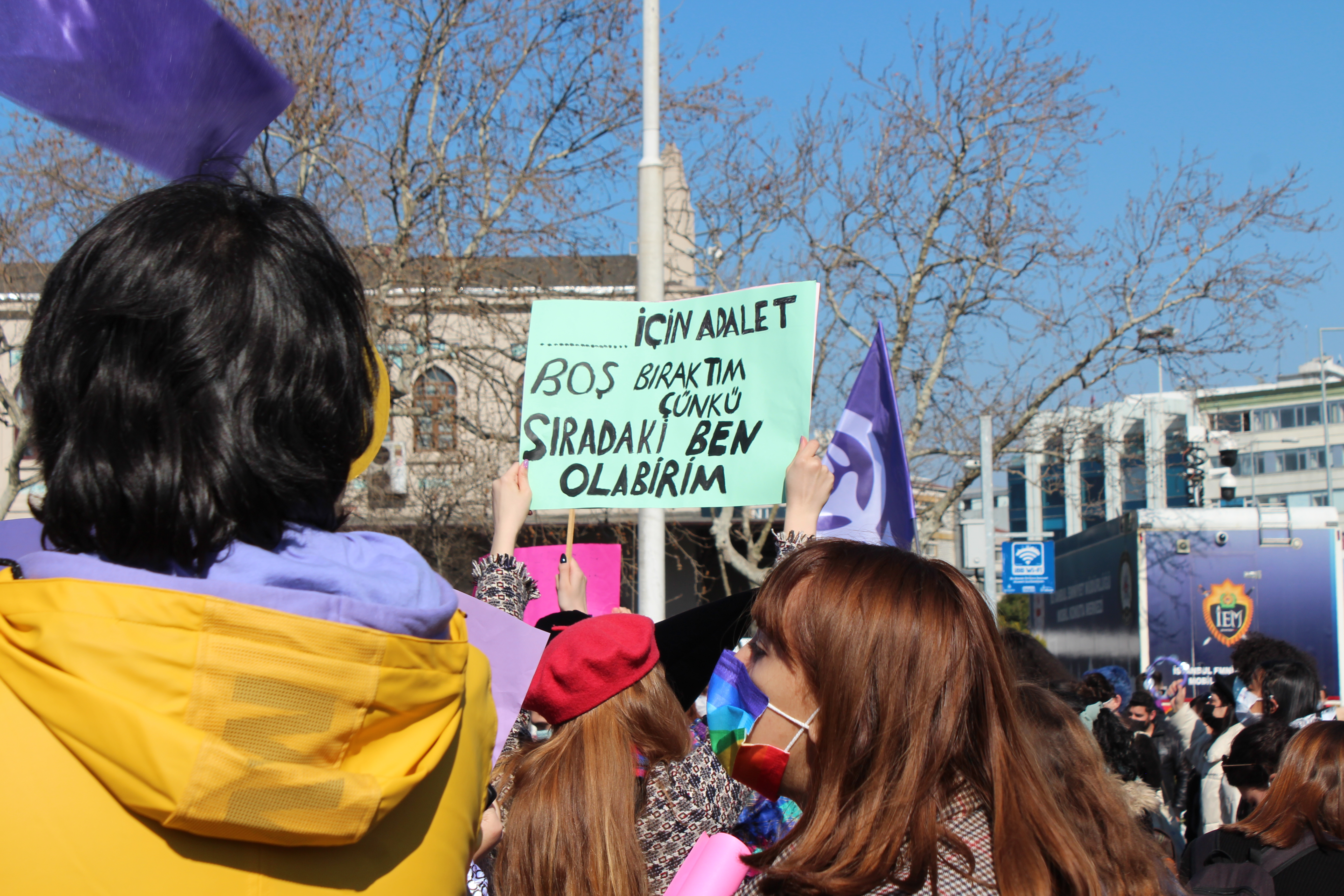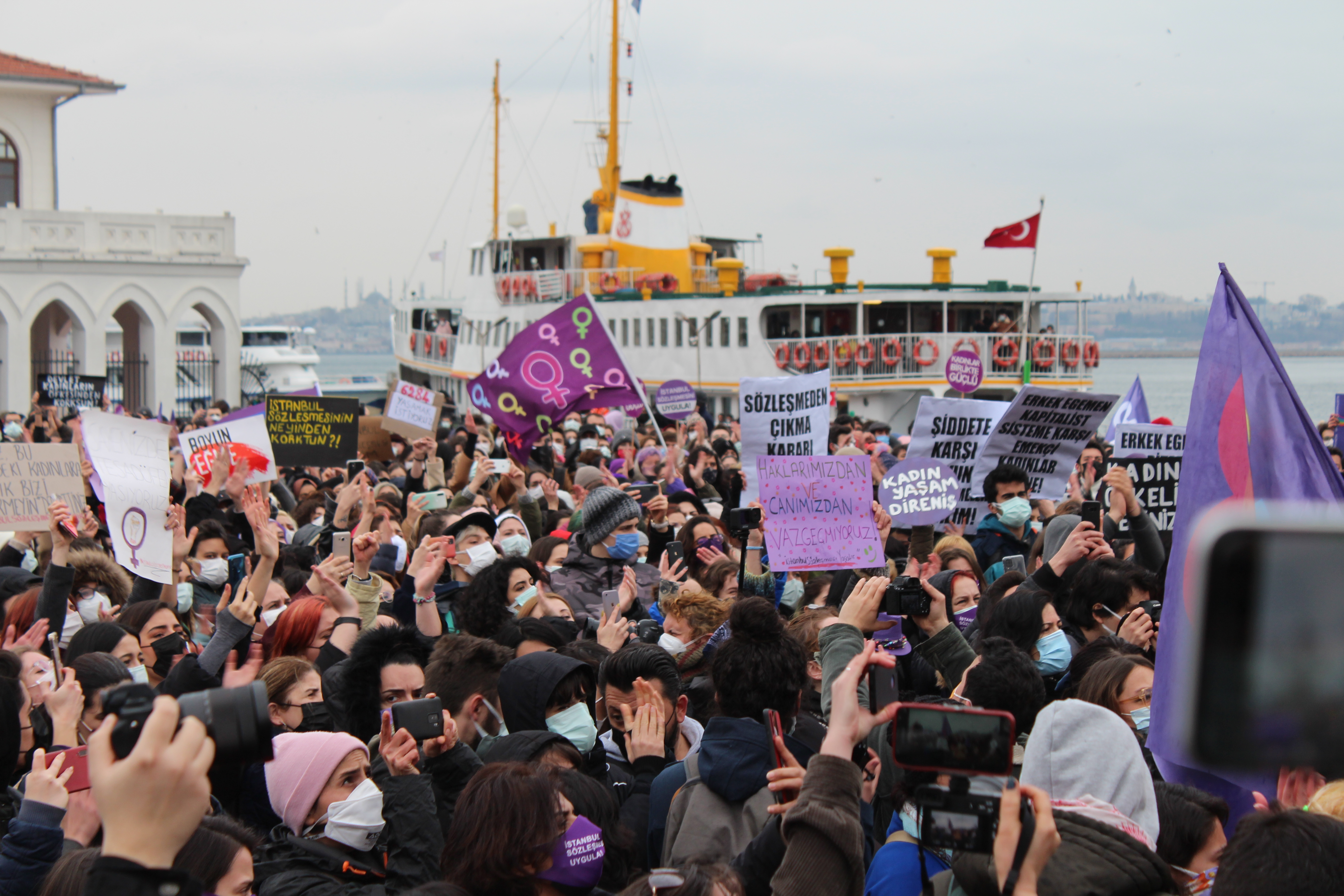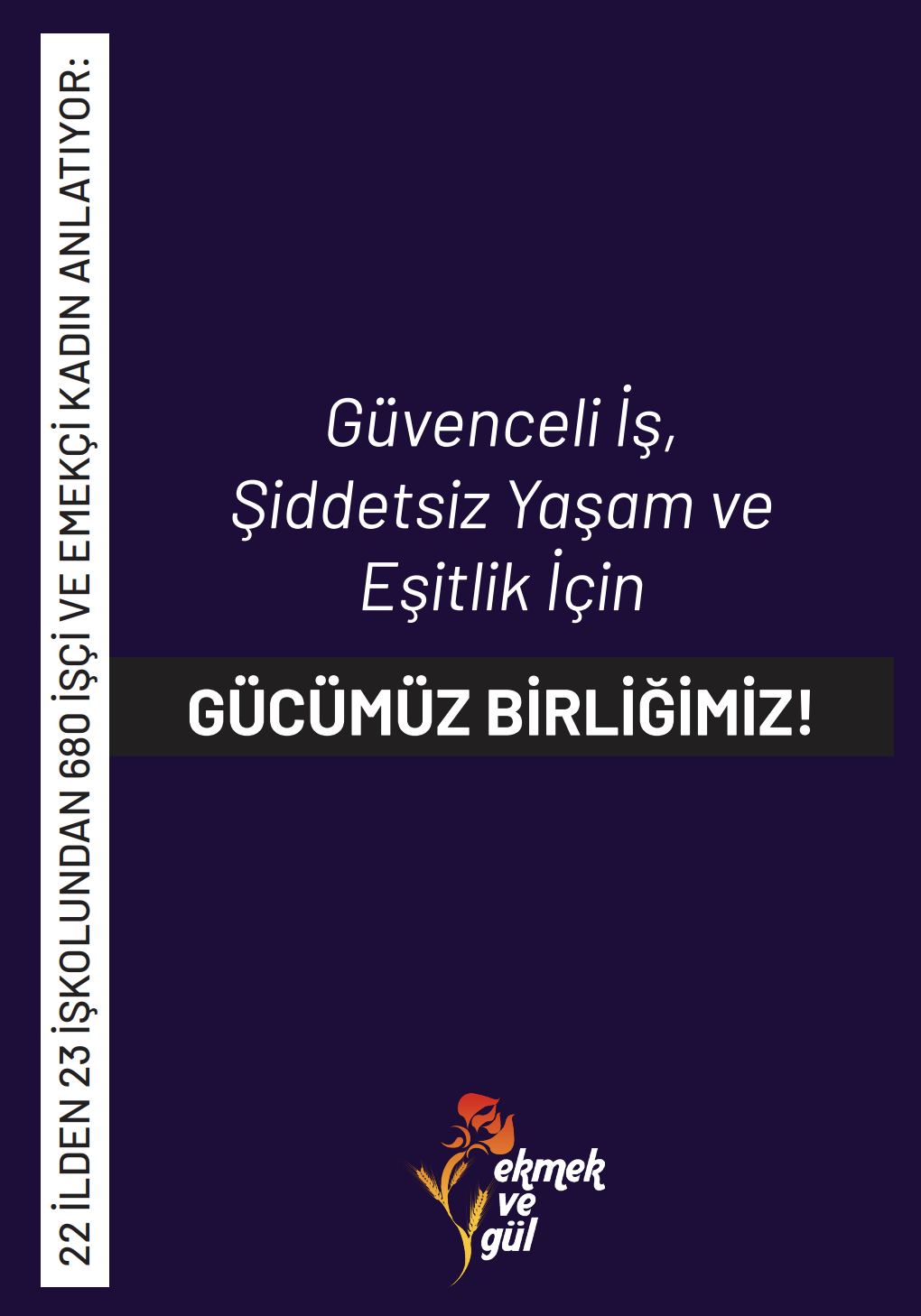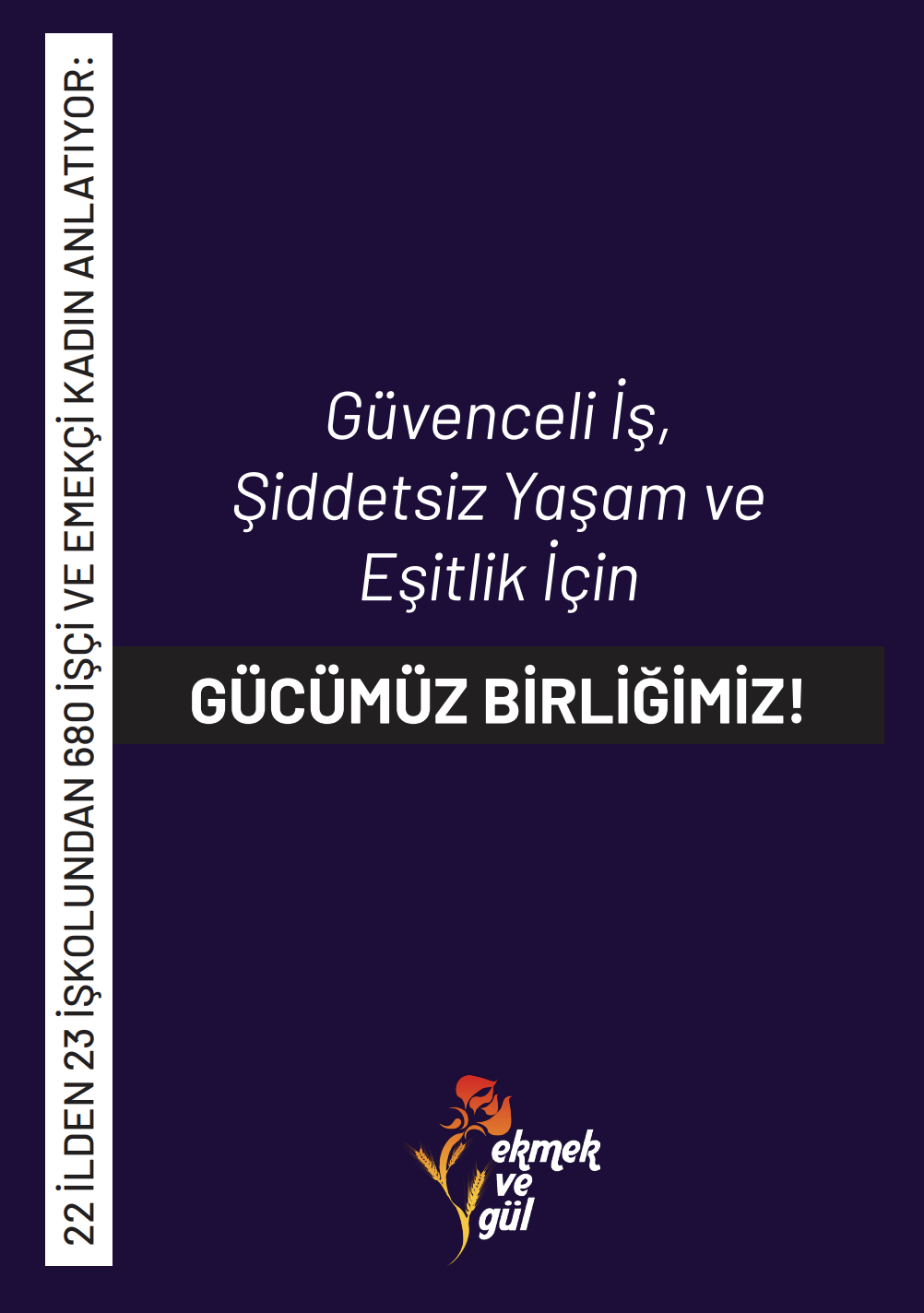Turkey’s AKP (Justice and Development Party)-MHP (Nationalist Action Party) coalition government, also known as the People’s Alliance, withdrew from the Council of Europe Convention on preventing and combating violence against women and domestic violence—better known as the “Istanbul Convention”—via a midnight presidential decree on 20 March 2021. The convention was one of the most important legal protections for women in Turkey, aiming to protect women from forced marriage and physical, sexual, and psychological violence. The Erdoğan government withdrew from the Convention to increase its suppression over one of the most dynamic social forces and to gather and energize the most reactionary elements of the society.
Following the government’s decision, on 20 March and 27 March, Istanbul’s Kadıköy Rıhtım Square witnessed protests, alongside demonstrations across the country led by women’s rights organizations and other democratic forces.
At the Rally
The protests were full of fierce, tenacious, and concerned women along with their comrades in struggle. One sign said, “Justice for…I left it blank because I might be the next.” A social media post reacted: “I don’t want to be courageous when I go out, I want to be free.” Recently, Kadıköy has been a center of protests for people in Istanbul after the state shut down Taksim Square. Two weekends in a row, led by young women, people gathered by the Beşiktaş pier. Protestors taking advantage of flexed Istanbul COVID restrictions did not hesitate to push back against riot cops’ physical harassment: among other things, protestors had to go through body searches at the square. State forces harassed and often gassed people but eventually allowed them to protest.
Patriarchal social pressure fostered by the People’s Alliance besieges women of Turkey in all facets of life and empowers the state against their resistance. The People’s Alliance frequently mobilizes the most reactionary groups around itself to help suppress all resistance. The rights of women are a hot political debate in Turkey, although the cold patriarchal reality has been a part of daily life for a long time. For example, Anitsayac.com documents the hundreds of femicides that take place in Turkey each year.
Many commentators emphasized the AKP’s urgent need to gather support and votes in the face of the many crises facing the country. The AKP’s overwhelming repression of the women’s movement is often viewed through this lens. It energizes its militant conservative base by labeling the Istanbul Convention as “a setup of the West” and "LGBTQ+ propaganda,” and claim that the expression “gender” is pro-LGBTQ+.
Sevda Karaca: “The Women’s Movement Has Been an Important Obstacle for the AKP”
Sevda Karaca (37) is an editor of Ekmek ve Gül (Bread and Roses), a monthly magazine for and by working class women. She says that the attacks were not new: “In Turkey, the attacks against the Istanbul Convention are not new from anti-women’s rights groups like religious sects and cults, ‘Divorced Dads Platform,’ and the ‘Family Council.’ The biggest move was made after July 2020.” Karaca views the issue as a political move to gather support: “The AKP government, whose grassroots support melted as a result of its policies, took the ‘attack’ plan as a blessing that put in front of these groups in order to strengthen its alliance with Islamist and nationalist forces. In August, government spokesmen themselves mentioned that Turkey can withdraw from the Istanbul Convention, which has accelerated debates. In Turkey, the women's movement responded as they went to the streets continuously with the provincial platforms that are installed all over the country and campaign groups.”
Karaca highlights that the women’s movement has been an important obstacle for the AKP as the party began to lose support among women due to its defense of patriarchal violence: “Nationally, violence against women and children is the number one topic that any other topics or the quickly changing discussions can’t change. This is the most common problem that the broad sections of women agree on, regardless of which party they voted for. In addition to that, in the context of conservative religious women, whom the government sees as its base, it is important that they hold the government responsible for this issue. This means that the political consequences of the government’s policies concerning women have increased. Increasing poverty, unemployment, violence against women, femicides, and abuse of children in recent years constitute the main sources of the questioning and reservations of women who previously voted for the AKP. Indeed, recent research shows that this questioning is slowly becoming a rupture. It is stated that around 10-15 percent of women from all age groups who voted for the AKP before, no longer support the party. The government wanted to divide the holistic response to the problem of violence that unites broad sectors of women, by appealing to the most reactionary forces of society. Just before terminating the Istanbul Convention, they made five articles in the Human Rights Action Plan about violence against women. But women have seen many similar action plans in Turkey; the AKP has not implemented even one.”
The withdrawal from the Istanbul Convention has begun to yield bitter fruits. Karaca says: “Not more than ten days after the decision, we see that law enforcement officers avoided taking the necessary measures to protect women from violence, and they explained this as ‘the law has changed, we have returned to the old system.’” On 6 April, correspondents Hilal Tok and Volkan Pekal of Ekmek ve Gül wrote that following the withdrawal, arbitrary practices of law enforcement agencies to refuse applications from women victims of violence and objections for applying protection orders in courts are increasing. Several cases took places in Istanbul, Adana, and Dersim.

The sign reads, "Justice for… I left it blank because I might be the next." The March 27 demonstration. Photo by author.
Feride Eralp: “It Is an Effort Is to Reshape Society and Politics through Us”
Feride Eralp (30), a feminist activist from the “Apply the Istanbul Convention” campaign group, says that the decision to withdraw from the convention is dangerous and adds: “This is a decision that has a direct impact on the lives of women. Law 6284, the Protection of Family and Prevention of Violence Against Women Act, guarantees that women who are subjected to male violence can get a protection order when they go to the police station, that they can move to a shelter without having to get a report of assault, that they are not sent back home, and said that 'we do not receive an application, go to the family court.' It describes the guarantee as well as some measures that are not in this law. Of course, this has never been exactly the case in practice; we have always faced a lot of difficulties. But especially since the debate on the termination of the Istanbul Convention, we have seen that the authorities try not to support women who are trying to stand up and stay away from violence if they do not know their rights.”
Eralp underlines why the state utilizes anti-LGBTQ+ policies: “The state said we are behind the murderers, not women, and by doing this with an incredibly homophobic language, it legitimized all kinds of violence and discrimination against LGBTQ+ people. By targeting the phrase 'gender equality,' it made invisible that inequality underlies violence and normalized it.”
Asked about the sentiment on the ground, she responded: “Solidarity, anger, anxiety, and bitterness are emotions and states that go hand in hand. On the one hand, we know that international documents such as the Istanbul Convention and laws such as 6284 were made possible by feminist struggle. In other words, we have already acquired these rights, and therefore we know that as long as we exist, as long as our struggle exists, even if they take away our rights on paper, they will not be able to divide us and create the submissive and agreeable model women they want.”
Eralp also pointed out that this attack matters for all of society: “This is not just an attack against the Istanbul Convention, women, LGBTQ+ s. The effort is to reshape society and politics through us. It is happening not only in Turkey but in many parts of the world simultaneously. There is a global right-wing conservative attack from anti-abortion policies, to LGBTQ+ phobia and opposition to equality. Therefore, we have to stand against this all together.”
The Withdrawal Harms Poor and Working-Class Women the Most
On March 8, Ekmek ve Gül’s reporters released a report on poor and working class women by gathering survey data from 680 working women who are working in 23 different sectors in 22 provinces and major cities.
[Click the images to access the PDFs.]
According to the report, 44.8 percent of women work irregular hours; 39 percent of the women interviewed in the report say that there has been a significant increase in their work intensity. A food service worker from Istanbul said: "More work has started to be done with less staff; the work done before the pandemic is now done with half the people.”
The narratives of women working in steel and electronics manufacturing also reveal that, as the number of COVID cases increase among workers, the burden is placed on workers who are not sick yet. An electronics worker stated: “Our working hours have not increased, but our workload has increased. We had to make up for our friends who were sick with COVID. We were exposed to threats when things did not catch up.”
The report, which shows that monitoring and supervision in the workplace has become widespread during the pandemic, pointed out that when intense working conditions are resisted, the pressure intensifies. A textile worker said: “Foremen are scolding us when we make mistakes. He is trying to get rid of the pressure on himself by pressuring us. Women who are harassed in the workplace cannot make a grievance at the risk of being punished. When it comes to harassment, the fear of being reported or laid off is decisive.”
Seventy-seven percent of the 680 women interviewed said that their time at home has increased. Thirty-four percent of women state that their leisure time has decreased compared to before the pandemic. Ninety-five percent say they are more tired and exhausted than before the epidemic. Seventy-eight percent of the women state that they feel "anxiety," fifty-three percent of them "stress," and fifty-one percent of them feel “unhappiness.” A staggering seventy-nine percent of women say that violence against women has increased during the pandemic.
A striking point also shows that women are also increasingly willing to act. Seventy-five percent of women answered "yes" when asked whether or not they would participate in a workplace action for workplace rights during the pandemic, while only 19.5 percent answered "no". Those who said “no” justified their answer based on their fear of being laid off. Seventy-two percent of women also believed the government was primarily responsible for the pandemic working conditions while only 10 percent blamed employers.
Sevda Karaca suggests that this resulted from the weakness of the unions and women’s organizations in organizing working-class women: “For the last 15 years, we have experienced the living and working conditions of working women get worse and more difficult with each passing day. The government aims to manage the economic crisis that broke out before the pandemic, which only deepened with the pandemic with more oppressive and authoritarian practices. One of the ways to solve this crisis in favor of capital is to put the livelihood and care burden of millions of working families on women….However, there are big shortcomings in both unions which are essential organizations of workers and the women’s movement in general to organize poor working women and bring them together for their rights and demands in Turkey….We are a network of women who try to represent the demands and expectations of workers and working women within the women's movement, and maintain their organization in the ‘invisible’ workers' basins and poor neighborhoods of the cities.”

The March 27 demonstration. Photo by author.
All the Same, but Sisters United
Women’s struggle has a long history in Turkey, in which the rulers, secular or conservative, either underestimated the power of the movement or attempted to erase their role. In history books, the founding father of Turkey, Mustafa Kemal Ataturk, has always been famous for delivering women’s suffrage. There has been no mention in the official narrative about Ottoman women and then Republican women’s struggle for equality. For Turkish seculars, the image of modern and republican women can contain a war pilot who bombed the Kurds, Sabiha Gökçen, or a prime minister, Tansu Çiller, a neoliberal who is infamous for her counter-insurgency operations. But the current movement is dangerous for both wings of the bourgeois. Since its contemporary roots in the 1980s, the women’s movement has welcomed many of the discriminated sections of society through sisterhood, including the Kurds, who already developed their own women’s movement together with a feminist tradition under the name of jineoloji.
But for conservatives, the suppression of this movement means the suppression of general dissent in the society. Although the Erdoğan government and their ally the MHP attack the women’s movement relentlessly, they cannot suppress it. This is in part because the movement is so large, as it includes hundreds of women’s organizations, and most importantly does not have a conventional leadership. For example, Turkish security forces did not attack women protestors at the feminist night march, but rather detained them the next day. The reason for the detention of women was bizarre: “jumping along to the rhythm.” Security forces also targeted individual transgender women and LGBTQ+ organizers, as they could not attack the movement as a whole. The government claims that the LGBTQ+ movement harms the “Turkish family structure.” So they removed themselves from the Istanbul Convention protections by manipulating conservative homophobic sentiments.
Although Fatma Betül Sayan Kaya, the vice president of the AKP, made a statement that they are preparing an Ankara Convention instead of the Istanbul Convention, the women’s organizations of Ankara called out governmental officials by saying: “You say we are preparing the Ankara Convention. As women from Ankara, we are done with your bragging. Do your duty first.” In her statement, the vice president of the party also said: “In recent years, we have seen that different lobbies are made over the Convention. It was not a Convention owned by the opposition. However, starting in July this year, they (the opposition) have been campaigning (for the Convention) to completely oppose (the government).” By saying this, the vice president labeled that the convention has been used against them for political purposes and not for women rights’ at all. They claim that the Convention was not defended by the opposition initially.
All in all, the International Working Women’s Day and Istanbul Convention protests and demonstrations have been strong and widespread despite the pandemic and police repression. Economic instability, pandemic-related problems, and anti-democratic practices especially affect women workers, who are threatening with their active role in support of protests. Beyond that, conservative women, mostly supporters of the AKP and MHP, have also lent silent support towards the movement. For example, a team of ultranationalists established a group called “Turkish Feminist Movement.” By using their social media platforms, they claimed that they are “different” from the others because they are against “separatist” values, which means they are anti-Kurdish. This is a provocative tactic that has been used by Turkish ultra-nationalists to divide social movements by using the ongoing Kurdish national question. The women’s movement here has a lot of support and legitimacy, and because of this, the AKP-MHP alliance will not cease its attacks and attempts to divide and suppress the movement.
In the days of general hopelessness among genuine forces for peace, labor, and democracy, the women’s movement is an important beacon that brings energy and determination for other social movements to be motived sentimentally and logistically against the capital-mafia-corrupt state. While one can hear their famous slogan “We are not silent, We are not afraid, We do not obey” [“Susmuyoruz, Korkmuyoruz, İtaat etmiyoruz”] in a Boğaziçi student demo, some can see their militants also struggle in the ranks of workers, LGBTQ+, and environmental justice struggles, and leftist parties.

